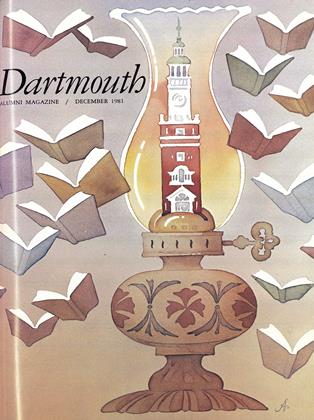On a weekend in early October, when the visitors from William and Mary were taking the measure of the football team, some 215 alumni visitors were also in town for a convocation to measure the Campaign for Dartmouth. They came from nearby and far away (like Hawaii). They heard some speeches and some figures ($157.3 million raised toward a revised goal of $85 million, with 15 months to. go).
One of the alumni visitors was Joe Mathewson '55, who liked the speeches and the figures and who, it seems, liked a whole series of get-togethers with students and faculty, too. Given a choice ahead of time, Mathewson chose to stay in a dormitory (McLane) instead of some place like the Hanover Inn. That experience, given some dormitory residents we know, could havebeen an eye-opening not to say earshattering reintroduction to college life, but Mathewson, who. was accompanied by his high-school age daughter (who presumably has instructed him in the mysteries of stereo tunes and other youthful arcana), seemed to enjoy himself. His report:
"Welcome alums! We love you." The unexpected message was left on the door of a McLane Hall room by the under- graduates who had to vacate it for the two days of the campaign convocation. There were others like it up and down the corridor. On the campus, students noticed our name tags and acknowledged us with friendly smiles and greetings. The student play at Collis Center was interrupted to recognize the alumni in the audience.
The Dartmouth's weekend edition, questioning student leaders about the future of the College, quoted one as stating that the alumni "are a force that monitors Dartmouth and tries to preserve its traditions." Another said: "Alumni influence on this campus is imperative to running the College. We need alumni."
The faculty went overboard on our behalf. They took alumni into their homes for the weekend. They taught a dozen freshman seminars for the alumni on Saturday morning (when classes no longer are held). One of the teachers, Michael Dorris, was being married that same day. Another, Richard Hyde, stimulated such a lively exploration of ethical and moral issues taken from Plato's Republic that the discussion extended well beyond the allotted class time. Hans Penner, the towering new dean of the faculty of arts and sciences, flattered us by saying, "Without you we could not be what we are today."
David McLaughlin, said one of our hosts, is "rebuilding a sense of community here." But it's not so much a rebuilding as a building. Never in my 30 years as a member of the Dartmouth community have I felt such a sense of closeness and warmth among students, faculty, and alumni. My classmate Jerry Daniell, now chairing the History Department, who has always been a critically constructive voice within the College, told me the new president has done everything right in his early dealings with the faculty, melting their initial skepticism.
With faculty and curriculum strong at the end of the Kemeny years, McLaughlin is concentrating on improving social activities and dormitory and fraternity life, including a continuation of the push he started as trustee chairman to upgrade the fraternity buildings. "He puts the problem of undergraduate life at or very near the top of his list of priorities," one of the student leaders told The Dartmouth.
Administration-alumni contacts and meetings like this one can be orchestrated, but the warmth of the welcome given us during the weekend cannot be manu- factured. Most important, student smiles even from those who have to vacate their rooms are surely not programmable. One grateful alumnus was moved to write a poem to his unseen undergraduate hosts, thanking them for their contribution to the Campaign for Dartmouth.
This model showing the proposed site of the Hood Museum was presented to the trustees in November. The design, by the architecturalfirm, headed by Charles Moore, would link the new museum with turreted Wilson Hall to the north and Hopkins Center to the west.
 View Full Issue
View Full Issue
More From This Issue
-
 Feature
FeatureHard times in the pressure-cooker
December 1981 By Mary Ellen Donovan -
 Feature
FeatureAmerica's First Hostage Negotiator
December 1981 By Peter Bridges -
 Feature
FeatureFirst Five Months
December 1981 By Shelby Grantham -
 Feature
FeatureEven Shoes Are Back
December 1981 By Nancy Wasserman '77 -
 Article
ArticleA Skeptic in Simian Clothing
December 1981 By Rob Eshman '82 -
 Sports
SportsAn Unexpected Pleasure
December 1981 By Brad Hills '65
Article
-
 Article
ArticleFunds for Annual Credit to Alumni Fund
January 1946 -
 Article
Article1941 A Roundabout Call
February 1947 -
 Article
ArticleThe Houses Should All Go Coed
December 1992 -
 Article
ArticleGeorgia
APRIL 1970 By FLOWER W. JONES '58 -
 Article
ArticleDo Good Computers Make Good Writers?
APRIL 1997 By Noel Perrin -
 Article
ArticleMedical School
April 1943 By Rolf C. Syvertsen M' 22


